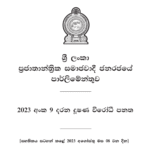Background
This case, heard in the Supreme Court of Sri Lanka, involved three fundamental rights applications filed by the Centre for Policy Alternatives and other petitioners. The petitioners challenged the legality and constitutionality of the Prevention of Terrorism (De-radicalization from holding violent extremist religious ideology) Regulations No. 1 of 2021 (referred to as the “impugned Regulations”), introduced under the Prevention of Terrorism (Temporary Provisions) Act No. 48 of 1979(PTA). The regulations were introduced in response to the Easter Sunday attacks in April 2019, targeting rehabilitation for individuals allegedly holding violent extremist religious ideologies.
Legal Issues Raised
The petitioners argued that the regulations violated several fundamental rights guaranteed under the Sri Lankan Constitution:
- Article 10 – Freedom of thought, conscience, and religion.
- Article 12(1) – Equality before the law and equal protection.
- Article 13 – Rights related to liberty and protection from arbitrary arrest.
The court granted leave to proceed on these claims and issued an interim order suspending the operation of the regulations.
Court’s Findings and Reasoning
- Violation of Freedom of Thought (Article 10)
- Article 10 guarantees absolute freedom of thought and belief, which cannot be restricted even under circumstances of national security. The court noted that the impugned Regulations violated this freedom by targeting “violent extremist religious ideology” without providing a clear or specific definition of what constituted such an ideology. This lack of specificity led to the risk of arbitrary enforcement and infringed on individual freedoms.
- Equal Protection and Legal Certainty (Article 12(1))
- The court found the regulations vague, particularly concerning their purpose and scope. Regulation 2, for instance, described objectives unrelated to de-radicalization and introduced confusing and ambiguous terms, potentially subjecting individuals to arbitrary enforcement. This ambiguity was deemed a violation of the constitutional principle of equality before the law, as it enabled subjective interpretation and discrimination.
- Rights against Arbitrary Arrest and Pre-trial Punishment (Articles 13(1) and 13(5))
- The regulations allowed for individuals suspected of “connection with” an offense under the PTA to be detained and referred for rehabilitation without due process. Regulations allowed certain individuals to be referred for rehabilitation without trial or formal charges, thus bypassing legal safeguards and violating the presumption of innocence enshrined in Article 13(5).
- Extension of Detention and Rehabilitation Periods without Judicial Oversight
- The impugned regulations permitted the executive (specifically, the Minister of Defence) to unilaterally extend the rehabilitation period without judicial approval. This encroachment on judicial power by the executive was found to violate Article 3 (sovereignty of the people) read with Article 4(c) (judicial power vested in the judiciary).
- Procedural Gaps and Inconsistencies
- Several procedural provisions of the regulations contradicted the recently enacted Bureau of Rehabilitation Act No. 2 of 2023, which introduced structured rehabilitation processes for certain offenders. This created legal inconsistencies, further emphasizing the court’s concern about the arbitrariness of the regulations.
Comparative and Jurisdictional Analysis
The court highlighted the need for procedural clarity and proportionality in rehabilitation-related regulations. Referencing practices from jurisdictions like the United States, Canada, and India, it underscored the importance of a robust, well-defined legal framework to avoid arbitrary detention and ensure protection of fundamental rights.
Judgment and Outcome
The Supreme Court concluded that the impugned regulations were incompatible with the constitutional rights guaranteed under Articles 10, 12(1), and 13. It declared the regulations null and void, citing their inherent flaws and inability to achieve intended de-radicalization goals in a manner consistent with fundamental rights.
The state was ordered to pay costs of Rs. 25,000 to each petitioner as compensation for the infringement of their rights.
Implications of the Judgment
- Limitations on Executive Power: This case emphasizes the limitations of executive power in enacting regulations that conflict with statutory law or infringe on fundamental rights.
- Rehabilitation vs. Arbitrary Detention: The judgment reinforces that rehabilitation efforts must comply with constitutional protections and procedural safeguards, including judicial oversight and respect for due process.
- Need for Legislative Clarity: The court highlighted the importance of precise language in regulations to prevent arbitrary application, urging legislative bodies to ensure regulations align with constitutional values and existing legal frameworks.
Conclusion
The court’s decision reaffirms Sri Lanka’s commitment to fundamental rights, highlighting the judicial system’s role in safeguarding individual freedoms against excessive or unclear governmental regulation. It serves as a reminder of the importance of due process, clarity in the rule of law, and adherence to constitutional principles, especially in contexts involving national security and counter-terrorism measures.
Read Judgement














